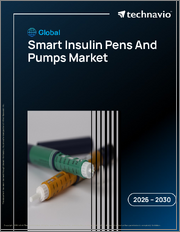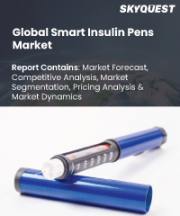
|
시장보고서
상품코드
1702007
스마트 인슐린 펜 시장 : 유형별, 사용성별, 적응증별, 커넥티비티별, 최종사용자별, 지역별(2025-2033년)Smart Insulin Pens Market Report by Type, Usability, Indication, Connectivity, End User, and Region 2025-2033 |
||||||
스마트 인슐린 펜 세계 시장 규모는 2024년에 1억 4,480만 달러에 달했습니다. 향후 IMARC Group은 이 시장이 2033년까지 3억 3,050만 달러에 달하고, 2025-2033년 9.6%의 연평균 성장률(CAGR)을 보일 것으로 예측했습니다.
스마트 인슐린 펜은 당뇨병 환자의 인슐린 투여를 효율적으로 관리할 수 있는 스마트폰 앱이 탑재된 재사용 가능한 주사기 펜입니다. 기존 인슐린에 비해 가격이 저렴하고 사용하기 쉬우며, 유용한 알림, 경고, 보고서를 제공합니다. 혈당, 탄수화물량, 식사량, 활성 인슐린 투여량을 계산하는 데 도움이 됩니다. 또한, 인슐린 유효기간 만료 및 온도 범위 초과를 알려주어 적시에 카트리지를 교체할 수 있도록 도와줍니다. 그 결과, 스마트 인슐린 펜은 전 세계 병원, 진료소, 외래수술센터(ASC), 재택 요양원 등에서 폭넓게 활용되고 있습니다.
스마트 인슐린 펜 시장 동향 :
현재, 스마트 인슐린 펜의 장점인 정확한 반용량 투여, 복용량 및 복용량 누락 방지, 복용 시간 및 횟수 추적 등에 대한 대중의 인식이 높아지면서 시장을 주도하는 중요한 요인 중 하나가 되었습니다. 이 외에도 전 세계적으로 비만과 노령 인구 증가로 인해 당뇨병 유병률이 증가하고 있습니다. 이는 급성장하는 헬스케어 산업과 함께 시장 성장을 강화하고 있습니다. 또한, 시장의 주요 업체들은 환자에게 지능형 주사를 제공하는 메모리 및 타이밍 기능을 갖춘 스마트 인슐린 펜을 도입하기 위해 연구 개발(R&D) 활동에 광범위하게 투자하고 있습니다. 또한, 블루투스 연결 스마트 인슐린 펜의 개발에도 주력하고 있습니다. 또한, 보다 편안하고, 편리하며, 개인 맞춤형 치료가 가능하기 때문에 재택 치료의 채택이 증가하고 있습니다. 이는 바늘 사용, 취급, 분해 또는 폐기 중 바늘에 찔리는 사고가 증가함에 따라 바늘을 사용하지 않는 인슐린 전달 장치에 대한 수요가 증가함에 따라 시장 성장을 가속하고 있습니다.
본 보고서에서 다룬 주요 질문
- 2024년 세계 스마트 인슐린 펜 시장 규모는?
- 2025-2033년 세계 스마트 인슐린 펜 시장의 예상 성장률은?
- 세계 스마트 인슐린 펜 시장을 이끄는 주요 요인은?
- 코로나19가 세계 스마트 인슐린 펜 시장에 미치는 영향은?
- 세계 스마트 인슐린 펜 시장의 유형별 시장 현황은?
- 세계 스마트 인슐린 펜 시장의 사용성별 시장 현황은?
- 세계 스마트 인슐린 펜 시장의 최종 사용자별 시장 점유율은?
- 세계 스마트 인슐린 펜 시장의 주요 지역은?
- 세계 스마트 인슐린 펜 시장의 주요 기업은?
목차
제1장 서문
제2장 조사 범위와 조사 방법
- 조사 목적
- 이해관계자
- 데이터 소스
- 1차 정보
- 2차 정보
- 시장 추정
- 보텀업 접근
- 톱다운 접근
- 조사 방법
제3장 주요 요약
제4장 서론
- 개요
- 주요 업계 동향
제5장 세계의 스마트 인슐린 펜 시장
- 시장 개요
- 시장 실적
- COVID-19의 영향
- 시장 예측
제6장 시장 분석 : 유형별
- 제1세대 펜
- 제2세대 펜
제7장 시장 분석 : 사용성별
- 프리필드
- 재이용 가능
제8장 시장 분석 : 적응증별
- 1형 당뇨병
- 2형 당뇨병
제9장 시장 분석 : 커넥티비티별
- Bluetooth
- USB
제10장 시장 분석 : 최종사용자별
- 병원 및 진료소
- 외래수술센터(ASC)
- 재택치료
제11장 시장 분석 : 지역별
- 북미
- 미국
- 캐나다
- 아시아태평양
- 중국
- 일본
- 인도
- 한국
- 호주
- 인도네시아
- 기타
- 유럽
- 독일
- 프랑스
- 영국
- 이탈리아
- 스페인
- 러시아
- 기타
- 라틴아메리카
- 브라질
- 멕시코
- 기타
- 중동 및 아프리카
- 시장 내역 : 국가별
제12장 SWOT 분석
- 개요
- 강점
- 약점
- 기회
- 위협
제13장 밸류체인 분석
제14장 Porter의 Five Forces 분석
- 개요
- 바이어의 교섭력
- 공급 기업의 교섭력
- 경쟁 정도
- 신규 진출업체의 위협
- 대체품의 위협
제15장 가격 분석
제16장 경쟁 구도
- 시장 구조
- 주요 기업
- 주요 기업 개요
- Bigfoot Biomedical Inc.
- Digital Medics Pty Ltd.
- Emperra GmbH E-Health Technologies
- Jiangsu Delfu Medical Device Co. Ltd.
- Medtronic plc
- Novo Nordisk A/S
- pendiq GmbH
- Ypsomed AG
The global smart insulin pens market size reached USD 144.8 Million in 2024. Looking forward, IMARC Group expects the market to reach USD 330.5 Million by 2033, exhibiting a growth rate (CAGR) of 9.6% during 2025-2033.
A smart insulin pen is a reusable injector pen with a smartphone app that facilitates patients with diabetes in managing their insulin delivery efficiently. It is more affordable, easy to use, and provides helpful reminders, alerts, and reports compared to conventional insulin. It helps calculate doses of the blood sugar level, carbohydrate amounts, meal size, and active insulin. In addition, it notifies the expiration date or exceeding the temperature range of insulin to replace the cartridge timely. As a result, smart insulin pen finds extensive applications in hospitals, clinics, ambulatory surgical centers, and home care units across the globe.
Smart Insulin Pens Market Trends:
At present, the growing awareness among the masses about the benefits of smart insulin pens, such as delivering accurate half-unit doses, preventing skipped or missed doses, and tracking time and number of doses, represents one of the key factors driving the market. Besides this, there is a rise in the prevalence of diabetes due to the increasing obesity and geriatric population across the globe. This, along with the burgeoning healthcare industry, is strengthening the growth of the market. In addition, key market players are extensively investing in research and development (R&D) activities to introduce smart insulin pens with memory and timing function that provides intelligent injection for patients. They are also focusing on developing Bluetooth-connected smart insulin pens. Moreover, there is an increase in the adoption of home treatment as it is more comfortable, convenient, and personalized. This, coupled with the escalating demand for needle-free insulin delivery devices due to the rising needle stick injuries while using, handling, disassembling, or disposing of needles, is bolstering the growth of the market.
Key Market Segmentation:
Breakup by Type:
- First Generation Pens
- Second Generation Pens
Breakup by Usability:
- Prefilled
- Reusable
Breakup by Indication:
- Type 1 Diabetes
- Type 2 Diabetes
Breakup by Connectivity:
- Bluetooth
- USB
Breakup by End User:
- Hospitals and Clinics
- Ambulatory Surgical Centers
- Home Care Settings
Breakup by Region:
- North America
- United States
- Canada
- Asia-Pacific
- China
- Japan
- India
- South Korea
- Australia
- Indonesia
- Others
- Europe
- Germany
- France
- United Kingdom
- Italy
- Spain
- Russia
- Others
- Latin America
- Brazil
- Mexico
- Others
- Middle East and Africa
Competitive Landscape:
The competitive landscape of the industry has also been examined along with the profiles of the key players being Bigfoot Biomedical Inc., Digital Medics Pty Ltd., Emperra GmbH E-Health Technologies, Jiangsu Delfu Medical Device Co. Ltd., Medtronic plc, Novo Nordisk A/S, pendiq GmbH and Ypsomed AG.
Key Questions Answered in This Report
- 1.What was the size of the global smart insulin pens market in 2024?
- 2.What is the expected growth rate of the global smart insulin pens market during 2025-2033?
- 3.What are the key factors driving the global smart insulin pens market?
- 4.What has been the impact of COVID-19 on the global smart insulin pens market?
- 5.What is the breakup of the global smart insulin pens market based on the type?
- 6.What is the breakup of the global smart insulin pens market based on the usability?
- 7.What is the breakup of the global smart insulin pens market based on the end user?
- 8.What are the key regions in the global smart insulin pens market?
- 9.Who are the key players/companies in the global smart insulin pens market?
Table of Contents
1 Preface
2 Scope and Methodology
- 2.1 Objectives of the Study
- 2.2 Stakeholders
- 2.3 Data Sources
- 2.3.1 Primary Sources
- 2.3.2 Secondary Sources
- 2.4 Market Estimation
- 2.4.1 Bottom-Up Approach
- 2.4.2 Top-Down Approach
- 2.5 Forecasting Methodology
3 Executive Summary
4 Introduction
- 4.1 Overview
- 4.2 Key Industry Trends
5 Global Smart Insulin Pens Market
- 5.1 Market Overview
- 5.2 Market Performance
- 5.3 Impact of COVID-19
- 5.4 Market Forecast
6 Market Breakup by Type
- 6.1 First Generation Pens
- 6.1.1 Market Trends
- 6.1.2 Market Forecast
- 6.2 Second Generation Pens
- 6.2.1 Market Trends
- 6.2.2 Market Forecast
7 Market Breakup by Usability
- 7.1 Prefilled
- 7.1.1 Market Trends
- 7.1.2 Market Forecast
- 7.2 Reusable
- 7.2.1 Market Trends
- 7.2.2 Market Forecast
8 Market Breakup by Indication
- 8.1 Type 1 Diabetes
- 8.1.1 Market Trends
- 8.1.2 Market Forecast
- 8.2 Type 2 Diabetes
- 8.2.1 Market Trends
- 8.2.2 Market Forecast
9 Market Breakup by Connectivity
- 9.1 Bluetooth
- 9.1.1 Market Trends
- 9.1.2 Market Forecast
- 9.2 USB
- 9.2.1 Market Trends
- 9.2.2 Market Forecast
10 Market Breakup by End User
- 10.1 Hospitals and Clinics
- 10.1.1 Market Trends
- 10.1.2 Market Forecast
- 10.2 Ambulatory Surgical Centers
- 10.2.1 Market Trends
- 10.2.2 Market Forecast
- 10.3 Home Care Settings
- 10.3.1 Market Trends
- 10.3.2 Market Forecast
11 Market Breakup by Region
- 11.1 North America
- 11.1.1 United States
- 11.1.1.1 Market Trends
- 11.1.1.2 Market Forecast
- 11.1.2 Canada
- 11.1.2.1 Market Trends
- 11.1.2.2 Market Forecast
- 11.1.1 United States
- 11.2 Asia-Pacific
- 11.2.1 China
- 11.2.1.1 Market Trends
- 11.2.1.2 Market Forecast
- 11.2.2 Japan
- 11.2.2.1 Market Trends
- 11.2.2.2 Market Forecast
- 11.2.3 India
- 11.2.3.1 Market Trends
- 11.2.3.2 Market Forecast
- 11.2.4 South Korea
- 11.2.4.1 Market Trends
- 11.2.4.2 Market Forecast
- 11.2.5 Australia
- 11.2.5.1 Market Trends
- 11.2.5.2 Market Forecast
- 11.2.6 Indonesia
- 11.2.6.1 Market Trends
- 11.2.6.2 Market Forecast
- 11.2.7 Others
- 11.2.7.1 Market Trends
- 11.2.7.2 Market Forecast
- 11.2.1 China
- 11.3 Europe
- 11.3.1 Germany
- 11.3.1.1 Market Trends
- 11.3.1.2 Market Forecast
- 11.3.2 France
- 11.3.2.1 Market Trends
- 11.3.2.2 Market Forecast
- 11.3.3 United Kingdom
- 11.3.3.1 Market Trends
- 11.3.3.2 Market Forecast
- 11.3.4 Italy
- 11.3.4.1 Market Trends
- 11.3.4.2 Market Forecast
- 11.3.5 Spain
- 11.3.5.1 Market Trends
- 11.3.5.2 Market Forecast
- 11.3.6 Russia
- 11.3.6.1 Market Trends
- 11.3.6.2 Market Forecast
- 11.3.7 Others
- 11.3.7.1 Market Trends
- 11.3.7.2 Market Forecast
- 11.3.1 Germany
- 11.4 Latin America
- 11.4.1 Brazil
- 11.4.1.1 Market Trends
- 11.4.1.2 Market Forecast
- 11.4.2 Mexico
- 11.4.2.1 Market Trends
- 11.4.2.2 Market Forecast
- 11.4.3 Others
- 11.4.3.1 Market Trends
- 11.4.3.2 Market Forecast
- 11.4.1 Brazil
- 11.5 Middle East and Africa
- 11.5.1 Market Trends
- 11.5.2 Market Breakup by Country
- 11.5.3 Market Forecast
12 SWOT Analysis
- 12.1 Overview
- 12.2 Strengths
- 12.3 Weaknesses
- 12.4 Opportunities
- 12.5 Threats
13 Value Chain Analysis
14 Porters Five Forces Analysis
- 14.1 Overview
- 14.2 Bargaining Power of Buyers
- 14.3 Bargaining Power of Suppliers
- 14.4 Degree of Competition
- 14.5 Threat of New Entrants
- 14.6 Threat of Substitutes
15 Price Analysis
16 Competitive Landscape
- 16.1 Market Structure
- 16.2 Key Players
- 16.3 Profiles of Key Players
- 16.3.1 Bigfoot Biomedical Inc.
- 16.3.1.1 Company Overview
- 16.3.1.2 Product Portfolio
- 16.3.2 Digital Medics Pty Ltd.
- 16.3.2.1 Company Overview
- 16.3.2.2 Product Portfolio
- 16.3.3 Emperra GmbH E-Health Technologies
- 16.3.3.1 Company Overview
- 16.3.3.2 Product Portfolio
- 16.3.4 Jiangsu Delfu Medical Device Co. Ltd.
- 16.3.4.1 Company Overview
- 16.3.4.2 Product Portfolio
- 16.3.5 Medtronic plc
- 16.3.5.1 Company Overview
- 16.3.5.2 Product Portfolio
- 16.3.5.3 Financials
- 16.3.5.4 SWOT Analysis
- 16.3.6 Novo Nordisk A/S
- 16.3.6.1 Company Overview
- 16.3.6.2 Product Portfolio
- 16.3.6.3 Financials
- 16.3.6.4 SWOT Analysis
- 16.3.7 pendiq GmbH
- 16.3.7.1 Company Overview
- 16.3.7.2 Product Portfolio
- 16.3.8 Ypsomed AG
- 16.3.8.1 Company Overview
- 16.3.8.2 Product Portfolio
- 16.3.8.3 Financials
- 16.3.8.4 SWOT Analysis
- 16.3.1 Bigfoot Biomedical Inc.



















